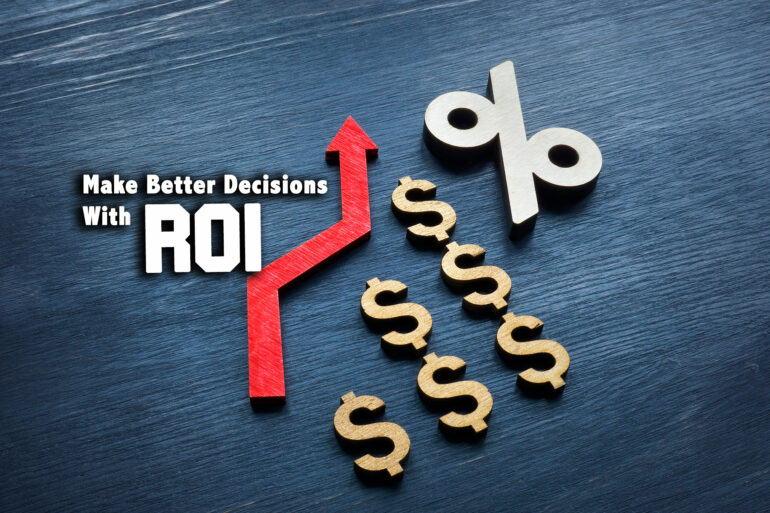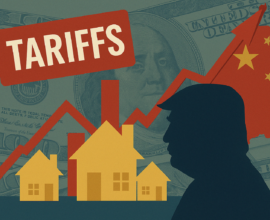What is ROI in Real Estate Investing?
Have you ever wondered how to make better decisions in real estate investing?
It’s not always easy, and it’s not always obvious. When you’re making an investment decision, like buying a new property, it can be helpful to break it down into more manageable pieces.
One of these pieces is financial — in terms of investment return, what can you expect from your choices?
This is where return on investment (ROI) comes in handy. In general, an ROI is the ratio between money invested and money returned.
Keep reading to learn how return on investment (ROI) can provide an extra level of insight that will give you the edge.
The better you understand how return on investment works, the more effectively you can use it as a tool when making financial decisions or when evaluating other people’s methods for making money.
What Is Return on Investment?
According to Investopedia, return on investment (ROI) is a financial metric that measures the amount of money you get back from an investment, relative to the amount you invested. It is often expressed as a percentage. A positive ROI means you made money; a negative number means you lost money.
Similar concepts include profit, yield, and economic value added. Return on investment is used by businesses and investors all over the world. It’s crucial to understand what this means to protect yourself from unscrupulous business ventures or flaky individuals.
The better you understand how return on investment works, the more effectively you can use it as a tool when making financial decisions or when evaluating other people’s methods for making money.
What Is Return on Investment (ROI) in Real Estate Investing?
Real estate is an asset class that can be very attractive to investors who have enough capital and persistence to ride out the ups and downs it often experiences. Return on investment, or ROI, is a metric that real estate investors use to evaluate the profitability of a particular investment property expressed as a percentage.
It’s a useful way to compare different properties to decide which one(s) would be the most profitable to purchase and renovate. This can be for any real estate investment, such as land, apartment, office, commercial building, and more.
To fully understand what an ROI is and how it affects you as an investor, it is first crucial to understand the meaning behind the word return. In general terms, a return is defined as any money that you receive or gain from an investment.
This can include profit, income, or even interest. The return on investment (ROI) refers to the amount of money that you have gained from your investment after all expenses have been accounted for.
How to Calculate ROI in Real Estate?
Return on investment (ROI) is the amount of profit made per dollar invested. It’s important to know what your return on investment will be before you invest in real estate.
The formula used to calculate ROI is:
(Net Profit / Acquisition cost) = Percentage return on investment (ROI)
Example 1
If you buy a house for $100,000 and sell it for $120,000 after one year, your ROI would be 20%. That would be calculated by taking $20,000 ($120,000 – $100,000) and dividing it by $100,000 (the amount you originally paid). Then multiply that number by 100% to get your ROI.
ROI = ($120,000 – $100,000) / 100,000 × 100 = 20%
Example 2
Let’s say you bought a two-bedroom apartment for $200,000 and spent an additional $20,000 on renovations. If you sell it for $300,000 two years later and spend another $20,000 on repairs during that time period, your total profit would be $60,000 ($300,000 – $240,000). Divide that number by your initial investment ($240,000), and you get a 15% ROI — which is pretty good!
ROI = ($300,000 – $240,000) / $240,000 × 100 = 15%
Calculate ROI using our online calculator on PropertyOnion.com. It’s easy to use, available for premium members, and helps you find a quick answer to the question: “Where do we go from here?”
According to Forbes, to calculate ROI in real estate, you must:
- Figure out your original cost and the final sale price of an investment property.
- Calculate the depreciation and other costs associated with buying and selling a property. Next, you’ll need to add up all of your expenses. These include down payment, closing costs, property taxes, and repairs and maintenance costs.
- Subtract the depreciation, maintenance costs, and capital expenditures from the final sale price to arrive at your gain on sale figure.
- Finally, divide the gain on sale by the cost of acquisition to arrive at your ROI percentage.
By using this metric, investors can accurately compare the performance of their different investments on an apples-to-apples basis.
How to Apply ROI in Investment Analysis?
Investment analysis is a process of identifying and examining the financial aspects of an investment proposal. This analysis may take different forms, depending on the nature of the business, but it generally includes an assessment of risk, profitability, and return on investment.
The analysis of real estate investment is more complex than that of other investments. In addition to identifying the expected cash flow and determining if the investment meets your objectives, you also need to consider location, zoning, condition, and other factors.
There are many ways to apply ROI in investment analysis, but here are a few:
Identify opportunities
There are many ways to identify opportunities in real estate. One example is using ROI (return on investment) analysis when analyzing potential deals by comparing cost versus the potential return of each deal.
This allows investors to focus on only those deals that show a good return potential based on their investment criteria and risk tolerance level.
The first step in identifying an opportunity is knowing what to look for. Several factors can help you recognize a good deal when it comes along.
Here are some examples:
- Cash flow
- Opportunities for appreciation
- Tax advantages
- Expanding your portfolio
By calculating the ROI of each property you own, you can determine which properties are performing well and which are not.
Calculate the ROI of each property
By calculating the ROI of each property you own, you can determine which properties are performing well and which are not. This can help you decide whether or not to keep a particular property or sell it off. In addition, if you buy more properties, you can compare them to your existing ones to see which ones give you the best returns.
Determine what property to invest in
Use the results of your calculations to determine which properties offer the highest return on investment to ensure that the property you choose offers a higher return compared to other similar properties in the same market area and price range.
Choose properties that have a lower risk profile than others that have lower returns but only slightly higher risks, such as those with higher vacancy rates or higher maintenance costs due to bad tenant behavior or poor maintenance habits by previous owners/management companies, etc.
Understand how long it takes for a property to pay for itself
When calculating your returns on investment (ROI), one important thing is figuring out how long it takes for itself. While it’s hard to say exactly how long a property will take to pay for itself, you can judge the potential ROI of a property by looking at the cash flow it produces and by knowing what other similar properties are renting for in the area. You can also find ways to increase profit from your rental properties.
What is a Good ROI?
These answers will vary depending on who you ask.
The ultimate goal of any investment is to make a profit. So how do you determine the best ROI for your investment? The answer is simple, but it may not be what you expect.
Is it 12%? 20%? 25%? 35%? More?
These answers will vary depending on who you ask. Some investors will tell you that anything under 10% is not worth the risk. Other investors may say that anything below 20% is too low, yet other investors will tell you that anything under 30% is unacceptable; they would have been better off just leaving their money in the bank or investing in some other way.
The truth is, however, there is no set figure or amount of money that makes a good or a bad investment; it all depends on the individual investor, their personal goals and needs, and the type of property or opportunity they are looking for.
If your goal is to simply get rich quickly, maybe real estate isn’t for you. But if your goal is to build long-term wealth, real estate could be an excellent fit for your investment strategy. The key is finding the right balance between risk and reward so that when all is said and done, you are satisfied with both your results and your peace of mind.
Convert Your Data into Growth
As market volatility and an unstable job market take their toll on our psyches and wallets, many of us are looking for alternative modes of income. Real estate seems like one of the more attractive options for those willing to brave the investment waters in search of greater returns.
But before you invest in any property, you’ll want to do your due diligence. As with any investment strategy, it’s best to create a long-term plan that considers all potential risks and opportunities, knowing that ROI remains among the most important parts of your asset management strategy.








